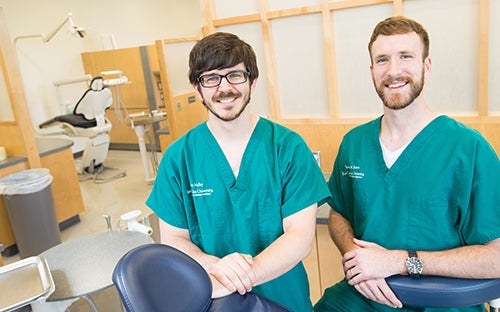Schweitzer Fellows bring oral health education to Pitt County Schools
Two students in the School of Dental Medicine set out on a journey to educate young students about oral health care—but they learned lessons of their own along the way.
Kevin Holley and Trevor Staton, 2017-2018 North Carolina Albert Schweitzer Fellows, partnered to take the reins of a previous Schweitzer project that aimed to providing preventive oral health education to school children. Three years ago, two dental students worked with the Greene Access Program (GAP), part of Greene County Health Care, to deliver oral health lessons to more than 1,200 elementary school children in Greene County. The fellows helped enroll the children in GAP clinical services, where they received care such as dental sealants to reduce tooth decay.

Dental students and Schweitzer Fellows Kevin Holley, left, and Trevor Staton will deliver oral health education to elementary students in Pitt County. (photo by Cliff Hollis)
“I think where we were at the beginning of our project and where we are now are very different, in positive ways,” Holley said.
Holley and Staton worked to expand the GAP participation at Eastern and Wahl-Coates elementary schools; Stokes, Chicod, and G. R. Whitfield schools, and Sadie Saulter Pre-Kindergarten Center. The schools were selected through public health data. The program focused on kindergarten through fifth-grade students. In addition to the oral health lessons and GAP enrollment, the current fellows assisted in a referral program to help children and their families find dental homes—dentist offices that can accommodate their unique and long-term care needs.
Staton and Holley will wrap up their efforts in April, when two new dental Schweitzer Fellows will build on their project, adding their own unique strategies and ideas as they move forward.
“Knowing that our project will have a lasting impact on the kids we worked with has inspired me to continue this kind of early intervention throughout my career,” Staton said. “I appreciate the students’ willingness to learn and I enjoyed getting out into the community.”
Holley and Staton used trial and error to figure out which strategies worked best for bringing oral health lessons into classrooms. They created lesson plans, set up communication lines and anticipate obstacles for getting their message to the target audience. Both Holley and Staton are married to local teachers, so they understood that they would need to meet students from all walks of life and with varying degrees of knowledge on oral health and individual dental care.
“The kids always ask great questions,” Holley said. “We try to show them that oral care is associated with different types of outcomes, so they have to take care of themselves. One of the lessons we try to emphasize is for the students to tell one person at home about one thing they learned from us.”
As a Pitt County native, Holley said having that kind of impact on local students means a lot as he pursues a career in the health-care field.
“As an individual that’s now in this career field, you look around and say, ‘What can I do?’” he said.
Staton said he was amazed at the insightful questions that the children asked, showing that they were processing what they learned.
“The range of background knowledge about oral hygiene and dentistry varied throughout each classroom, and this was made evident through the students’ questioning,” Staton said. “I was glad to help answer their questions and satisfy their curiosities.”
Holley and Staton were two of five students to earn Schweitzer Fellowships from the School of Dental Medicine in 2017. They joined five others from the Brody School of Medicine, making ECU’s contingent nearly half of North Carolina’s total class, which was made up of 23 students from ECU; Duke, Wake Forest and North Carolina Central universities; and the University of North Carolina–Chapel Hill.
While working with community-based organizations to spur needed change in their chosen areas, Schweitzer Fellows also underwent leadership development training to instill in them the importance of improving life for people who experience barriers to care or other life necessities.
“As Dr. Albert Schweitzer said, ‘I have always held firmly to the thought that each one of us can do a little to bring some portion of misery to an end,’” Staton said. “It is my hope this project has helped in some way to do just that and I will continue to pursue such endeavors in my future.”
Since 1994, the North Carolina Albert Schweitzer Fellowship Program has supported 425 fellows from a variety of academic disciplines through funding from numerous foundations, academic institutions and individual donors. The North Carolina class joins nearly 240 other students nationwide.